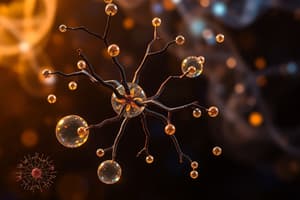Podcast
Questions and Answers
Which factor is NOT essential for determining the rate of a chemical reaction?
Which factor is NOT essential for determining the rate of a chemical reaction?
- Concentration of reactants
- Presence of a catalyst
- Color of the reactants (correct)
- Temperature
Which statement best describes homeostasis in organisms?
Which statement best describes homeostasis in organisms?
- The ability to evolve over generations
- The immediate response to environmental changes
- The programming of cells for division
- The process of maintaining internal stability (correct)
What mechanism is primarily responsible for evolutionary change?
What mechanism is primarily responsible for evolutionary change?
- Mutation
- Gene flow
- Natural selection (correct)
- Genetic drift
Which of the following best defines biotechnology?
Which of the following best defines biotechnology?
Which factor is primarily responsible for limiting an ecosystem’s carrying capacity?
Which factor is primarily responsible for limiting an ecosystem’s carrying capacity?
What is a characteristic of matter identified by learners at the end of Grade 5?
What is a characteristic of matter identified by learners at the end of Grade 5?
Which of the following describes the role of heat in changes of state according to learners?
Which of the following describes the role of heat in changes of state according to learners?
What skill do learners use to plan and conduct a simple scientific investigation?
What skill do learners use to plan and conduct a simple scientific investigation?
What do learners use to group living things?
What do learners use to group living things?
At the end of Grade 6, which separation technique do learners demonstrate skills in?
At the end of Grade 6, which separation technique do learners demonstrate skills in?
What term do learners use to describe changes that can return materials to their original state?
What term do learners use to describe changes that can return materials to their original state?
Which of the following statements about fair tests do learners recognize?
Which of the following statements about fair tests do learners recognize?
How do learners explain the reproduction of plants?
How do learners explain the reproduction of plants?
What is one of the main characteristics of science as described in the content?
What is one of the main characteristics of science as described in the content?
Which of the following best describes science as a process?
Which of the following best describes science as a process?
How is scientific knowledge characterized in the content?
How is scientific knowledge characterized in the content?
What does it mean for science to have limits?
What does it mean for science to have limits?
Which statement best reflects the dynamic nature of science?
Which statement best reflects the dynamic nature of science?
Which definition of science describes it as a body of knowledge?
Which definition of science describes it as a body of knowledge?
What does the statement 'science is a quest for understanding certain aspects of human experience' imply?
What does the statement 'science is a quest for understanding certain aspects of human experience' imply?
What is the significance of the distinction between science as a product and science as a process?
What is the significance of the distinction between science as a product and science as a process?
What is one of the key benefits of the Scientific Method in education?
What is one of the key benefits of the Scientific Method in education?
Which method involves testing numerous options to discover effective solutions?
Which method involves testing numerous options to discover effective solutions?
In scientific practice, how are models primarily used?
In scientific practice, how are models primarily used?
Which method relies on previous knowledge to create new ideas?
Which method relies on previous knowledge to create new ideas?
What role does documenting play in scientific practices?
What role does documenting play in scientific practices?
Which of the following describes a limitation of the traditional Scientific Method?
Which of the following describes a limitation of the traditional Scientific Method?
What type of testing is commonly conducted for consumer products?
What type of testing is commonly conducted for consumer products?
What is the main purpose of making models in science?
What is the main purpose of making models in science?
What is the primary focus of culture-based education in the Philippines?
What is the primary focus of culture-based education in the Philippines?
Which of the following best describes a benefit of applying cultural values in education?
Which of the following best describes a benefit of applying cultural values in education?
How does culture-based education contribute to a student's worldview?
How does culture-based education contribute to a student's worldview?
What role do culture carriers play in culture-based education?
What role do culture carriers play in culture-based education?
What is a key outcome of culture-based education as stated in the content?
What is a key outcome of culture-based education as stated in the content?
Which aspect is NOT considered a component of culture-based education?
Which aspect is NOT considered a component of culture-based education?
What is the perceived effect of cultural memory preservation in education?
What is the perceived effect of cultural memory preservation in education?
What is one of the foundational ideas supporting culture-based education?
What is one of the foundational ideas supporting culture-based education?
Flashcards are hidden until you start studying
Study Notes
What is Science?
- Science is the investigation and understanding of natural phenomena that occur daily.
- Science is a body of knowledge obtained through observation, experimentation, and reasoning.
- Science is a process of acquiring refined knowledge through empirical observation, experimentation, and analysis.
- Science is considered both a product (the body of knowledge) and a process (the methods used to acquire knowledge).
Nature of Science
- Science deals with observable and verifiable phenomena.
- Science knowledge is based on empirical data, making it evidence-based and tentative.
- Science knowledge is inherently uncertain, making it dynamic and constantly expanding.
- Science incorporates objectivity and open-mindedness when investigating environmental issues and community concerns.
Methods of Conducting Science
- Experimentation is the most common method but there are others.
- Trial and error: Testing multiple possibilities to find a solution, like drug and pesticide research.
- Product testing: Evaluating the effectiveness and safety of products, like car safety tests.
- Inventing: Combining prior knowledge and developing new ideas through trial and error.
- Making models: Creating physical or theoretical representations to understand complex processes.
- Documenting: Keeping records over time to study trends and changes, like weather patterns and ecological shifts.
The Significance of Culture-based Education in the Philippines
- Culture is the foundation of education, sustainable development, and governance, providing perspective, methodology, and evaluation framework.
- Culture-based education grounds student learning on the community's unique values, norms, cultural beliefs, practices, heritage, language, and experiences.
- It promotes understanding, awareness, and appreciation of Filipino history, arts, heritage, and geography.
- It aims to produce culturally empowered and literate Filipinos who are committed global citizens and ardent nationalists.
Motive of Culture-based Education
- Nurturing a sense of belonging and identity, promoting community participation, and fostering appreciation of history and cultural heritage.
- Preserving the crucial role of community culture carriers in teaching and learning.
- Cultivating a sense of responsibility for valuing, developing, and protecting the environment.
- Developing competencies and cultural skills for global interaction.
- Instilling a sense of national pride and developing individual identity as a Filipino.
- Preserving cultural memory to understand the nation's destiny in the global community.
Studying That Suits You
Use AI to generate personalized quizzes and flashcards to suit your learning preferences.




